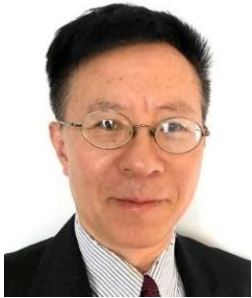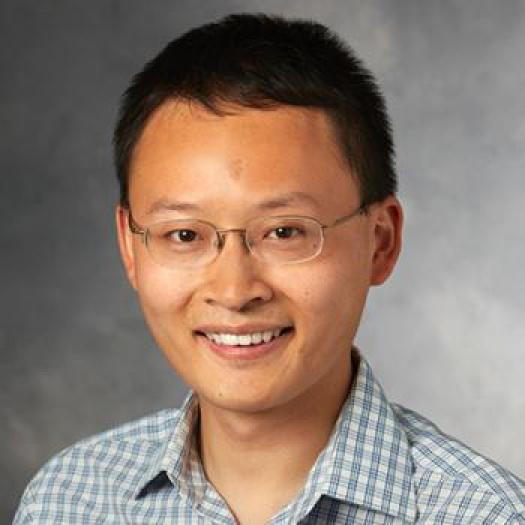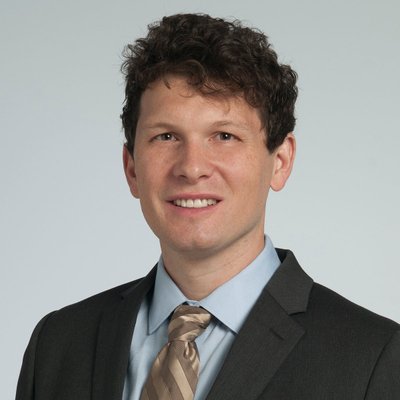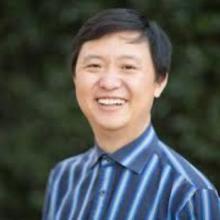THE 4th STAT4ONC ANNUAL SYMPOSIUM
Invited Session 4
May 7, 2021
1:45 PM – 3:15 PM Pacific Time
Real World Data and Real World Evidence in Oncology Research
Chair : Jie Chen (Overland Pharma)

Jie received a medical degree from Shanghai First College of Medicine (now Fudan University School of Public Health) and a Ph.D. in statistics from Temple University, Philadelphia.
James Zou (Stanford)
 James Zou is an assistant professor of biomedical data science at Stanford University. James develops novel machine learning algorithms that have strong statistical guarantees and that are motivated by im proving human health. He has received several best paper awards, the NSF CAREER Award, a Google Faculty Award, a Tencent AI award, a Sloan Fellowship and is a Chan-Zuckerberg Investigator.
James Zou is an assistant professor of biomedical data science at Stanford University. James develops novel machine learning algorithms that have strong statistical guarantees and that are motivated by im proving human health. He has received several best paper awards, the NSF CAREER Award, a Google Faculty Award, a Tencent AI award, a Sloan Fellowship and is a Chan-Zuckerberg Investigator.
TIME : 1:45 - 2:10
Title : Using machine learning and RWD to make clinical trials more inclusive
Restrictive eligibility criteria is often a major bottleneck for clinical trials. Here we present a data-driven framework, Trial Pathfinder, to help design trial eligibility. Applying Trial Pathfinder on the oncology real-world data shows that several common exclusion conditions can be broadened to increase the pool of eligible patients while maintaining safeguards for safety.
Brian Hobbs (Dell Medical School, The University of Texas at Austin, Austin, TX)
 Dr. Hobbs completed a doctoral degree in biostatistics at the University of Minnesota and then joined The University of Texas MD Anderson as an Assistant Professor of biostatistics. His expertise spans Bayesian methodology and trial design as well as clinical and translational oncology. Dr. Hobbs was promoted to Associate in 2017, and then recruited to Cleveland Clinic to found a Section of Cancer Biostatistics. He joined The University of Texas Dell Medical School in August 2020 as a tenured Associate Professor. The Eastern North American Region of International Biometric Society selected his thesis paper for the John Van Ryzin Award in 2010. In 2016, Dr. Hobbs was selected by The University of Minnesota for the Emerging Leader Award, an honor bestowed on alumni on the basis of impactful contributions within 10 years of graduating from one of The School of Public Health’s 20 programs. Recognized as an expert in clinical oncology research methodology, in 2018 Dr. Hobbs was invited to lead the publication of National Cancer Institute’s Clinical Trials Design Task Force with the goal of providing national, consensus recommendations for first-in-human cancer drug trials that use seamless designs. In 2019, Dr. Hobbs was invited to describe recent advances and current issues with basket trial designs in the Journal of Clinical Oncology Precision Oncology. In 2020, he was invited to contribute to an article for Nature Reviews Clinical Oncology describing the current state of tumor agnostic trials. Dr. Hobbs has served as a scientific advisor to Amgen, STCube, Bayer HealthCare Pharmaceuticals Inc. and consultant to Pfizer.
Dr. Hobbs completed a doctoral degree in biostatistics at the University of Minnesota and then joined The University of Texas MD Anderson as an Assistant Professor of biostatistics. His expertise spans Bayesian methodology and trial design as well as clinical and translational oncology. Dr. Hobbs was promoted to Associate in 2017, and then recruited to Cleveland Clinic to found a Section of Cancer Biostatistics. He joined The University of Texas Dell Medical School in August 2020 as a tenured Associate Professor. The Eastern North American Region of International Biometric Society selected his thesis paper for the John Van Ryzin Award in 2010. In 2016, Dr. Hobbs was selected by The University of Minnesota for the Emerging Leader Award, an honor bestowed on alumni on the basis of impactful contributions within 10 years of graduating from one of The School of Public Health’s 20 programs. Recognized as an expert in clinical oncology research methodology, in 2018 Dr. Hobbs was invited to lead the publication of National Cancer Institute’s Clinical Trials Design Task Force with the goal of providing national, consensus recommendations for first-in-human cancer drug trials that use seamless designs. In 2019, Dr. Hobbs was invited to describe recent advances and current issues with basket trial designs in the Journal of Clinical Oncology Precision Oncology. In 2020, he was invited to contribute to an article for Nature Reviews Clinical Oncology describing the current state of tumor agnostic trials. Dr. Hobbs has served as a scientific advisor to Amgen, STCube, Bayer HealthCare Pharmaceuticals Inc. and consultant to Pfizer.
TIME : 2:10 - 2:30
Title : The expanding role of dose expansion cohorts and potential for real world evidence
Immune checkpoint inhibitors have yielded promising therapies for patients experiencing refractory cancers. Trials evaluating ICIs made extensive use of phase Ib, enrolling hundreds and even more than one thousand patients into dose expansion cohorts following dose-escalation. This represents a departure from conventional drug development strategies, for which dose expansion cohorts were used in roughly 25% of phase trials. Moreover, when incorporated into phase I design, dose expansion cohorts enrolled substantially fewer patients. Designs with inclusive eligibility may conserve patient and financial resources when compared to the expense of conducting a series of standalone trials for each indication. The statistical implications of expansive phase I trials requires further consideration, however. Trialists and regulators need to decide how to evaluate a trial’s operating characteristics in the presence of heterogeneity among tumor types. The convention paradigm for trial design emphasizes a few or single possible scenario or outcome, however this reduces the potential scope of possibilities when explicitly considering dose expansion cohorts that span multiple tumor types. Conventional approaches to statistical design may fail to provide a comprehensive evaluation of the trial's properties across various scenarios of heterogeneity. Moreover, expanding sample sizes to hundreds of patients facilitates an extent of information that would traditionally require an appropriate level of type I error control and strategies for interim monitoring to halt enrollment to cohorts that underperform the trial’s pre-specified expectations. This presentation reviews dose expansion cohorts for phase I trials of three immune checkpoint inhibitors and discusses the potential role for real-world evidence in this setting.
George W. Sledge MD (Stanford University School of Medicine)
TIME : 2:30 - 2:50
Title : Real World Evidence in Oncology: Promise and Challenges
Real world evidence (RWE) is defined by the FDA as “ the clinical evidence regarding the usage and potential benefits or risks of a medical product derived from analysis of Real World Data.” Recent years have seen an explosion in studies and publications based on RWE, as well as guidance documents from the FDA regarding the use of RWE in support of regulatory decision-making for drugs, biologics and devices. As the creation of RWE analyses have increased, both the strengths and weaknesses of RWE have become evident. On the plus side of the balance sheet, RWE offers researchers the ability to probe numerous questions that cannot be answered by Phase III clinical trials, and to examine patients not included in such trials through exclusionary entry criteria. On the minus side, RWE studies too easily devolve into collections of anecdotes representing biased populations drawn from limited populations; lack of statistical rigor and poorly formed scientific hypotheses often doom these analyses to false interpretations. For RWE to justify the effort higher rather than lower standards seen if more formal clinical are required, which will be discussed in the talk.
Qi Xia (Genentech)
 Qi Xia is a Senior Director in Oncology Biostatistics, Genentech/Roche. She joined Genentech in 2005 upon receiving her Ph.D. in Statistics from Rutgers University. She currently oversees the data sciences and statistics in late stage development of cancer immunotherapies in Lung cancers. She is passionate about rigorous drug development, innovative trial design, and robust decision making.
She is particularly interested in improving drug development via practical innovation and increased efficiency.
Qi Xia is a Senior Director in Oncology Biostatistics, Genentech/Roche. She joined Genentech in 2005 upon receiving her Ph.D. in Statistics from Rutgers University. She currently oversees the data sciences and statistics in late stage development of cancer immunotherapies in Lung cancers. She is passionate about rigorous drug development, innovative trial design, and robust decision making.
She is particularly interested in improving drug development via practical innovation and increased efficiency.
TIME : 2:50 - 2:58
Lu Tian (Stanford)
 Lu Tian is Professor of the Department of Biomedical Data Science at Stanford University. He received his Sc.D. in Biostatistics from Harvard University. Dr. Tian has rich experience in conducting statistical methodological research, planning large epidemiological studies, running data management for randomized clinical trial and conducting applied data analysis. His current research interest is in developing statistical methods in precision medicine, meta analysis, survival analysis and high throughput data analysis.
Lu Tian is Professor of the Department of Biomedical Data Science at Stanford University. He received his Sc.D. in Biostatistics from Harvard University. Dr. Tian has rich experience in conducting statistical methodological research, planning large epidemiological studies, running data management for randomized clinical trial and conducting applied data analysis. His current research interest is in developing statistical methods in precision medicine, meta analysis, survival analysis and high throughput data analysis.